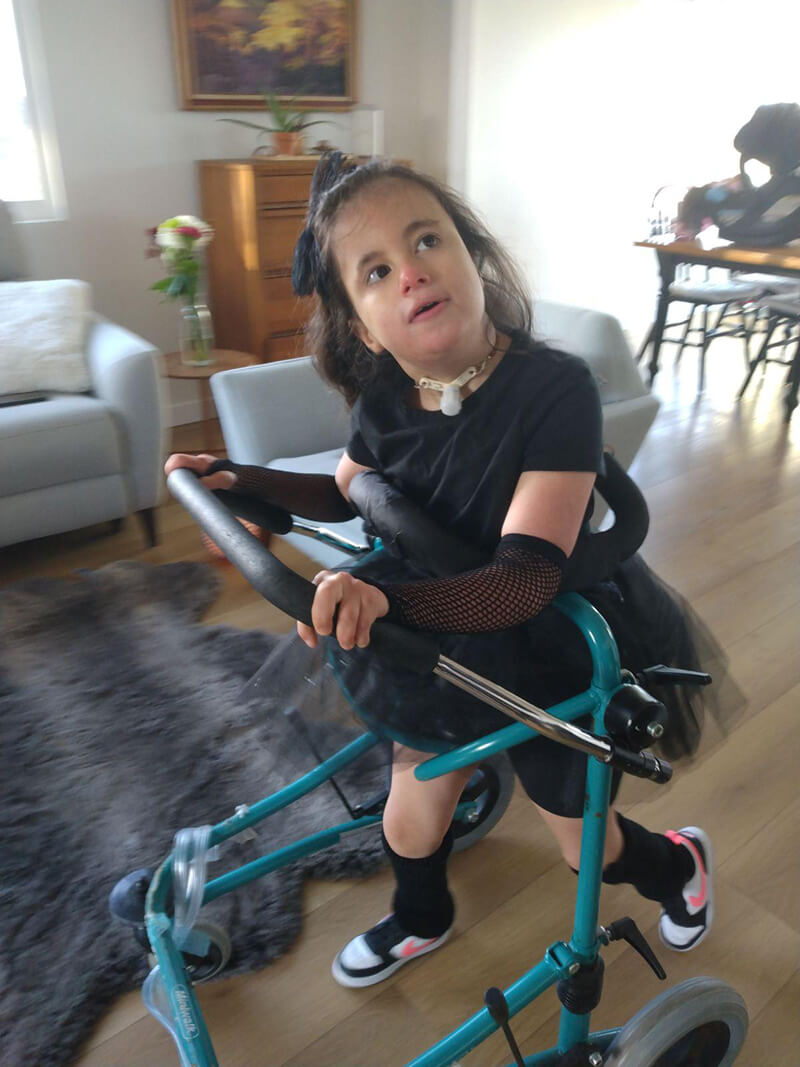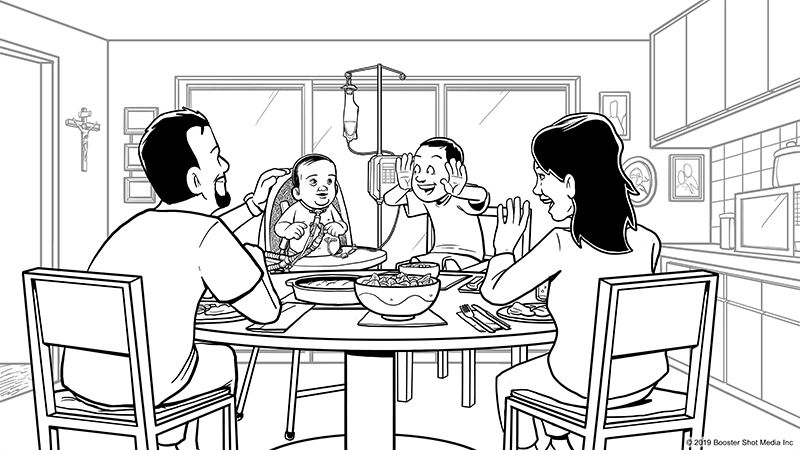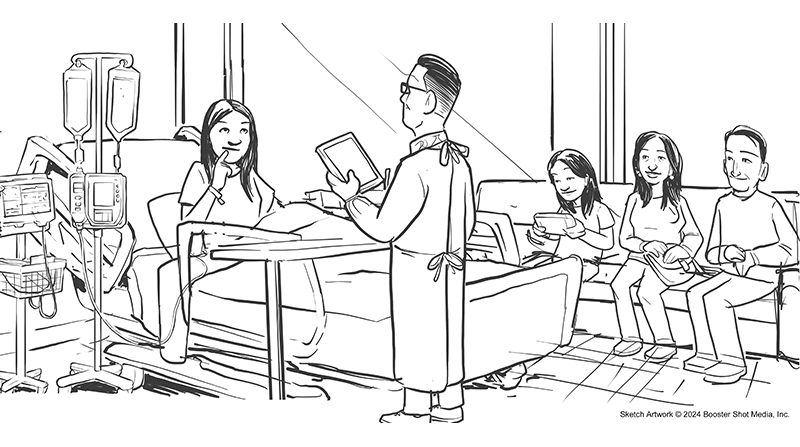Research Projects
The Trisomy Collaborative
Facilitating heath professionals’ capacity to support parents’ experience with Trisomy 13 and 18.
 Children with trisomy 13 and 18 have greater medical complexity, more significant neurological impairments, and more limited life expectancy than Down syndrome (trisomy 21). Medical and surgical interventions (cardiac surgery, tracheostomy) were rarely offered to these children until 10 to 15 years ago and most pediatric patients died within days, if not weeks or months. With greater willingness to provide medical care, close to 20% may live past one year. However, variability in health services remain. Many families choose comfort care but the availability of perinatal palliative care across the country is limited. Further, some parents who choose clinical interventions have negative experiences within health systems and do not feel supported by health care teams.
Children with trisomy 13 and 18 have greater medical complexity, more significant neurological impairments, and more limited life expectancy than Down syndrome (trisomy 21). Medical and surgical interventions (cardiac surgery, tracheostomy) were rarely offered to these children until 10 to 15 years ago and most pediatric patients died within days, if not weeks or months. With greater willingness to provide medical care, close to 20% may live past one year. However, variability in health services remain. Many families choose comfort care but the availability of perinatal palliative care across the country is limited. Further, some parents who choose clinical interventions have negative experiences within health systems and do not feel supported by health care teams.
Dr. Wilfond established the Trisomy Collaborative in 2024 to promote research, education and training, and advocacy to facilitate professional organizations’, health systems’ and clinicians’ capacity to support parents’ experience with trisomy 13 and 18, including decision-making about clinical options. While this new project is in its formative stages, this has been a long-standing topic of Wilfond’s scholarship.
- Koogler TK, Wilfond BS, Ross LF. Lethal language, lethal decisions. Hastings Cent Rep. 2003 Mar-Apr;33(2):37-41.
- Wilfond BS and Carey JC. Parental requests for interventions in children with lethal conditions. In Clinical ethics in pediatrics: A Case-based textbook. Ed Diekema DS, Mercurio MR, Adam MB, New York: Cambridge University Press, 2011. p174-180
- Janvier A, Farlow B, Wilfond BS. The experience of families with children with trisomy 13 and 18 in social networks. Pediatrics 2012 Aug;130(2):293-8.
- Janvier A, Farlow B, Barrington KJ, Bourque CJ, Brazg T, Wilfond BS. Building trust and improving communication with parents of children with Trisomy 13 and 18: A mixed-methods study. Palliat Med. 2020 Mar;34(3):262-271.
- St Louis JD, Bhat A, Carey JC, Lin AE, Mann PC, Smith LM, Wilfond BS, Kosiv KA, Sorabella RA, Alsoufi B. The American Association for Thoracic Surgery 2023 Expert Consensus Document: Recommendation for the care of children with trisomy 13 or trisomy 18 and a congenital heart defect. J Thorac Cardiovasc Surg. 2024 May;167(5):1519-1532.
HomeVENT
Promoting access to balanced information and supporting family decisions for tracheostomy and home mechanical ventilation.

Deciding about tracheostomy and home ventilation can be a challenging decision with profound consequences for the child and family. There is variability in what information parents are given and how alternatives are presented. Parents report feeling unprepared to make these decisions and some face challenges and conflicts with the healthcare team as they make these decisions.
HomeVENT (Home Values and Experiences Navigation Track) is a deliberative decision-support process for families and clinicians. First, HomeVENT uses a structured family deliberation for families to integrate their home life context and values into decisions about home ventilation. This intervention is anchored in a novel web-based tool that meets a key counseling gap: family-to-family information. Second, HomeVENT includes a novel structured team deliberation tool to help multidisciplinary clinical teams jointly assess a child’s treatment options in light of the family’s home context and values. In 2024, we began recruiting English and Spanish-speaking families at four geographically diverse institutions who are facing a decision who will be followed for 12 months.
HomeVENT is led by Dr. Renee Boss at the Berman Institute of Bioethics, Johns Hopkins University (R01 HD110414), and the web-based tool was created by Booster Shot Media. Dr. Wilfond co-leads the Seattle Children’s site with Dr. Holly Hòa Võ. Wilfond has been collaborating with Boss, as well as Dr. Carrie Henderson at Louisiana State University, for close to a decade.
- Bogetz JF, Munjapara V, Henderson CM, Raisanen JC, Jabre NA, Shipman KJ, Wilfond BS, Boss RD. Home mechanical ventilation for children with severe neurological impairment: Parents' perspectives on clinician counselling. Dev Med Child Neurol. 2022 Jul;64(7):840-846.
- Vo HH, Mercer AH, Jabre NA, Henderson CM, Boss RD, Wilfond BS. Parent perspectives on the child experience of pediatric home ventilation via tracheostomy. Hosp Pediatr. 2023 Dec 1;13(12):1124-1133.
- Vo HH, Wilfond BS, Ding Y, Henderson CM, Raisanen JC, Ashwal G, Thomas A, Jabre NA, Shipman KJ, Schrooten A, Shaffer J, Boss RD. Family-Reflections.com: Creating a parent-to-parent web-based tool regarding pediatric home ventilation. Patient Educ Couns. 2023 Sep; 114:107855.
- Boss RD, Vo HH, Jabre NA, Shepard J, Mercer A, McDermott A, Lanier CL, Ding Y, Wilfond BS, Henderson CM. Home values and experiences navigation track (HomeVENT): Supporting decisions about pediatric home ventilation. PEC Innov. 2023 Jun 7;2:100173.
- Henderson CM, S Wilfond B, Boss RD. Bringing social context into the conversation about pediatric long-term ventilation. Hosp Pediatr. 2018 Feb 1; 8(2)102-108
ENVISION
Improving informed consent for cystic fibrosis gene therapy research by training research coordinators to guide decisions based on people’s values.

Trust is essential for genetic therapy research because of the complexity of the research and uncertainty about risks. This is particularly important in cystic fibrosis (CF) research, due to a history of unmet expectations of the CF community. Informed consent materials, as well as engagement during the consent process, can contribute to realistic expectations and positive experiences, which, in turn, can build trust. However, consent forms have become long and hard to read. Research coordinators often focus on helping people understand the complex materials but do not always have the tools to help each person decide what is right for them.
ENVISION (ENgaging with Values to inform research decISIONS) will evaluate the acceptability and feasibility of a values-oriented platform for informed consent in an ongoing CF clinical trial. The platform, which uses a novel digital consent tool, is designed to facilitate research coordinators focusing on the key information for people to decide and to guide the decision based on understanding each person’s values and priorities. After refining the platform with feedback from people with CF, research coordinators, CF researchers, and IRBs, we will implement it and assess its impact in an ongoing multi-site trial." These data will position our team to collaborate with a genetic therapy sponsor and study team on a future proposal to implement and evaluate this platform in a gene therapy trial.
ENVISION began in 2023 with funding from the Cystic Fibrosis Foundation. Dr Wilfond co-leads the project with Professor Stephanie Kraft. Booster Shot Media is designing our digital tool.
- King NMP, Henderson GE, Churchill LR, Davis AM, Hull SC, Nelson DK, Parham-Vetter PC, Rothschild BR, Easter MM, and Wilfond BS. Consent forms and the therapeutic misconception: The example of gene transfer research. IRB: Ethics & Human Research. 2005 Jan-Feb;27(1):1-8.
- Kraft SA, Porter KM, Shah SK, Wilfond BS. Comprehension and choice under the revised common rule: Improving informed consent by offering reasons why some Enroll in research and others do not. Am J Bioeth. 2017 Jul;17(7):53-55.
- Wilfond BS, Porter KM. Reimagining the goal of informed consent to help patients make decisions about research. Am J Bioeth. 2020 May;20(5):22-23.
- Kraft SA, Porter KM, Duenas DM, Guerra C, Joseph G, Lee SS, Shipman KJ, Allen J, Eubanks D, Kauffman TL, Lindberg NM, Anderson K, Zepp JM, Gilmore MJ, Mittendorf KF, Shuster E, Muessig KR, Arnold B, Goddard KAB, Wilfond BS. Participant reactions to a literacy-focused, web-based informed consent approach for a genomic implementation study. AJOB Empir Bioeth. 2021 Jan-Mar;12(1):1-11.
- Joseph G, Leo MC, Riddle L, Guerra C, Amendola LM, Gilmore MJ, Rolf BA, Dorschner MO, Zepp J, Biesecker BB, Caruncho M, Hunter JE, Keast E, Lewis HS, Duenas D, Kauffman T, Bulkley JE, Anderson KP, Jarvik GP, Goddard KAB, Wilfond BS; CHARM Study Team. An accessible, relational, inclusive, and actionable (ARIA) model of genetic counseling compared with usual care: Results of a randomized controlled trial. Genet Med. 2022 Nov;24(11):2228-2239.
Pragmatic Clinical Trials
Supporting research informed consent practices that are respectful of families who are seeking clinical care.

Unlike research to evaluate new treatments, pragmatic clinical trials often involve research on medical practices. When more than one acceptable treatment is used in practice, doctors and researchers may be uncertain which is best, because the practices have not been directly compared. Pragmatic clinical trials are embedded in clinical care, and this raises unique ethical complexities because the boundaries between clinical care are research are blurred. For example, there is disagreement when pragmatic clinical trials compare treatments for serious conditions about how to describe the risks of these studies and the best approach to informed consent, especially if the researchers do not directly interact with patients.
Between 2013 to 2015, Dr. Wilfond co-led several empirical studies of stakeholder attitudes with Dr. Mildred Cho and Dr. David Magnus from Stanford University.
Since 2017, Dr. Wilfond has been a member of the Ethics and Regulatory Core for the NIH Pragmatic Clinical Trials Collaboratory (U24 AT009676). Through this service, Dr. Wilfond began collaborating with Dr. Stephen Freedman from the University of Calgary, on a study comparting two standardized treatment approaches to prevent hemolytic uremic syndrome at 26 institutions (R01 AI16532). This study is ongoing through 2026 and is a real-world example of the ethical challenges pragmatic clinical trials face regarding informed consent and the descriptions of risk.
- Kraft SA, Cho MK, Constantine M, Lee SS, Kelley M, Korngiebel D, James C, Kuwana E, Meyer A, Porter K, Diekema D, Capron AM, Alicic R, Wilfond BS, Magnus D. A comparison of institutional review board professionals' and patients' views on consent for research on medical practices. Clinical Trials. 2016 Oct; 13(5): 555-65.
- Magnus D, Wilfond BS. Research on medical practices and the ethics of disclosure. Pediatrics. 2015 Feb;135(2):208-10
- Morain SR, Kraft SA, Wilfond BS, Mcguire A, Dickert NW, Garland A, Sugarman J. Toward meeting the obligation of respect for persons in pragmatic clinical trials. Hastings Cent Rep. 2022 May;52(3):9-17
- Freedman SB, Schnadower D, Estes M, Casper TC, Goldstein SL, Grisaru S, Pavia AT, Wilfond BS, Metheney M, Kimball K, Tarr PI; Hyperhydration to Improve Kidney Outcomes in children with Shiga Toxin-producing E. Coli infection (HIKO-STEC) Study Team. Hyperhydration to improve kidney outcomes in children with shiga toxin-producing E. coli infection: A multinational embedded cluster crossover randomized trial (the HIKO STEC trial). Trials. 2023 May 27;24(1):359.
- Wilfond BS, Toraman Turk S, Kraft SA, Weiss EM, Tarr PI, Schnadower D, Freedman SB Distinguishing clinical and research risks in pragmatic clinical trials: The need for further stakeholder engagement. Am J Bioeth. 2023 Aug;23(8):39-42.
